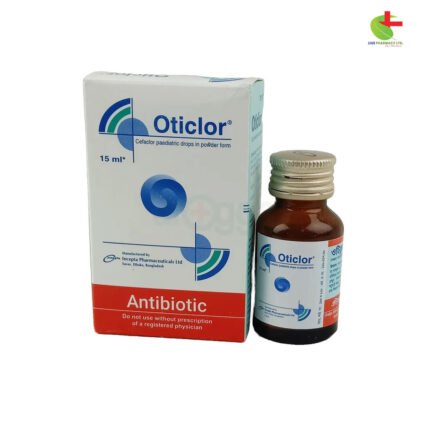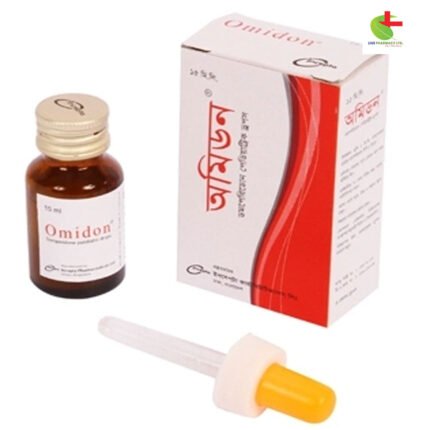

Emixef Pediatric Drops
100.00৳ Paediatric Drops(21ml)
- Emixef is an orally active cephalosporin antibiotic effective against a wide range of Gram-positive and Gram-negative bacteria.
- Indicated for treating acute infections such as upper and lower respiratory tract infections, as well as urinary tract infections.
- It maintains stability against beta-lactamase enzymes, making it suitable for resistant pathogens.
- Administered in varying dosages for adults, children, and those with renal impairment, with a general treatment duration of 7 to 14 days.
- Generally well tolerated, with mild side effects, it requires caution in patients with hypersensitivity or renal issues.
 Brand
Brand
|
Incepta Pharmaceuticals Ltd |
|---|---|
 Generics
Generics
|
Cefixime Trihydrate |
 Type
Type
|
Pediatric Drops |
Indications
Emixef is an orally administered cephalosporin antibiotic known for its strong in-vitro bactericidal action against a diverse range of Gram-positive and Gram-negative bacteria. It is specifically indicated for treating acute infections caused by susceptible microorganisms, including:
- Upper Respiratory Tract Infections (URTI): Such as otitis media, and other URTIs where the pathogen may be resistant to standard antibiotics, or where treatment failure poses significant risks.
- Lower Respiratory Tract Infections: Including bronchitis.
- Urinary Tract Infections: Such as cystitis, cystourethritis, and pyelonephritis.
Clinical studies confirm its effectiveness against common pathogens, including Streptococcus pneumoniae, Streptococcus pyogenes, Escherichia coli, Proteus mirabilis, Klebsiella species, Haemophilus influenzae (both beta-lactamase positive and negative), Moraxella catarrhalis, and Enterobacter species. Notably, Emixef demonstrates high stability against beta-lactamase enzymes.
Pharmacology
Cefixime, a third-generation semi-synthetic cephalosporin antibiotic, is effective against a wide spectrum of Gram-positive and Gram-negative bacteria at achievable plasma levels. It exerts its bactericidal effect by disrupting bacterial cell wall synthesis. Its high stability against beta-lactamase enzymes means that many organisms resistant to penicillins and some cephalosporins may still be susceptible to Cefixime. The drug is approximately 40% to 50% absorbed regardless of food intake.
Dosage & Administration
Cefixime’s absorption is minimally affected by food. The typical treatment duration is 7 days, extendable to 14 days if necessary.
Adults and Children Over 10 Years: The recommended dosage ranges from 200 to 400 mg daily, depending on infection severity, and can be administered as a single dose or divided into two doses.
Elderly Patients: Generally, the same dosing as adults is appropriate. However, renal function should be assessed, and dosage adjusted in cases of severe renal impairment.
Children: The recommended dosage is 8 mg/kg/day, given either as a single dose or in two divided doses. Suggested daily volumes of suspension include:
- 6 months to 1 year: 3.75 ml
- 1 to 4 years: 5 ml
- 5 to 10 years: 10 ml
For typhoid, children should receive 5 mg/kg body weight twice daily for 10-14 days. Children over 50 kg or older than 10 years should be treated with the adult dosage of 200-400 mg daily based on infection severity.
Renal Impairment: Normal dosing can be maintained in patients with creatinine clearance ≥20 ml/min. In patients with creatinine clearance <20 ml/min, a maximum dose of 200 mg once daily is advised. Dosing for patients undergoing chronic dialysis should follow similar guidelines.
Interaction
As with other cephalosporins, caution is advised as increases in prothrombin times have been reported in some patients, especially those on anticoagulant therapy.
Contraindications
Emixef is contraindicated in patients with known hypersensitivity to cephalosporin antibiotics.
Side Effects
Emixef is generally well tolerated. Most adverse reactions are mild and self-limiting. Common gastrointestinal side effects include diarrhea and stool changes, particularly at higher doses. Other less common side effects may include nausea, abdominal pain, dyspepsia, vomiting, and flatulence. Serious conditions like pseudomembranous colitis have been noted. Central nervous system reactions may include headache and dizziness. Hypersensitivity reactions such as rash, pruritus, urticaria, drug fever, and arthralgia have also been observed, usually resolving upon discontinuation of the drug. Hematological effects like thrombocytopenia, leukopenia, and eosinophilia are infrequent and reversible, with occasional mild changes in liver and renal function tests. Other reactions may include genital pruritus and vaginitis.
Pregnancy & Lactation
Due to a lack of adequate controlled studies in pregnant women, Emixef should be used during pregnancy only if deemed necessary. The excretion of Cefixime in human milk is unknown, so caution is advised when administered to nursing mothers.
Precautions & Warnings
Caution is warranted for patients with a history of hypersensitivity to other medications. Cephalosporins should be used cautiously in patients with penicillin allergies, as cross-allergenicity may occur. Should an allergic reaction to Emixef occur, discontinuation is necessary, and appropriate treatment should be provided. Use with caution in patients with significantly impaired renal function, as broad-spectrum antibiotics may disrupt normal intestinal flora and lead to Clostridium difficile overgrowth.
Overdose Effects
In cases of overdose, gastric lavage may be necessary, as no specific antidote exists. Emixef is not significantly removed from the bloodstream via hemodialysis or peritoneal dialysis. Adverse effects in healthy adults receiving doses up to 2 g were consistent with those seen at recommended doses.
Therapeutic Class
Third Generation Cephalosporins
Storage Conditions
Store below 30ºC, protected from light and moisture. Keep out of reach of children.











Reviews
There are no reviews yet.